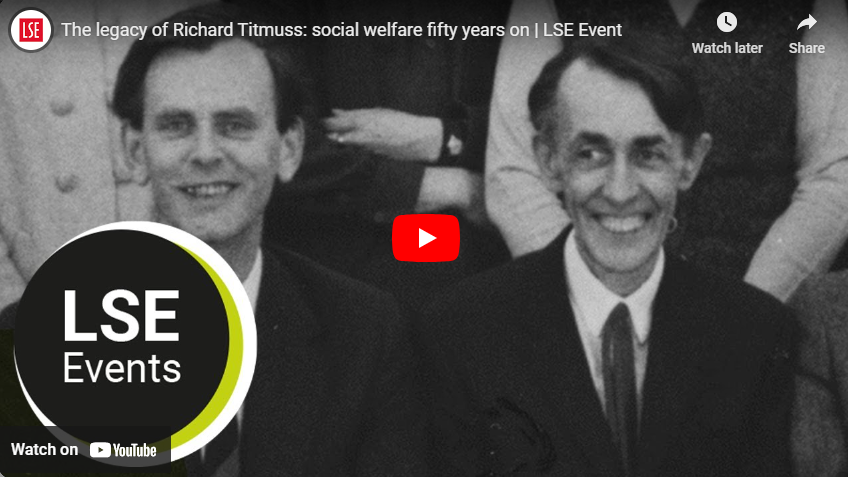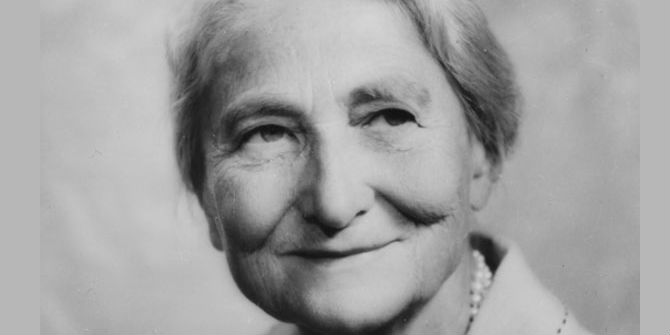Richard Titmuss, the first chair in Social Administration at LSE, died 50 years ago in 1973. From his appointment in 1950 until his death, Titmuss established and defined the field of social policy, writes his biographer Professor John Stewart.
In 1950, Richard Titmuss was appointed to the first chair in Social Administration at the London School of Economics, a post he held until his death in 1973. From this platform, he effectively created, and dominated, the academic field of social policy. The so-called “Titmuss paradigm” had a number of constituents, including a universalist, non-judgemental approach to social service provision; scepticism about “market” solutions to social problems; reservations over the achievements of the post-war “welfare state”; and welfare policy as a means of promoting social solidarity and altruism.[i] It is now, though, half a century since his death, so here I seek to show his continuing relevance across a range of discourses.
Not all those cited support Titmuss’s arguments, but what is significant is that they still engage with them. My examples come from the last 25 years, so should be seen in the context of neoliberalism’s present ideological dominance. Titmuss is thus employed in current disputes about the market’s role in more than just economic affairs, notwithstanding that all his own work was produced during the era of the post-war social-democratic consensus to which he notably contributed (although by the time of his death this was looking increasingly fragile).

First, examples of Titmuss in non-academic discourse. In 2002 the Labour leader of the recently-founded Welsh Assembly, Rhodri Morgan, claimed that his policy agenda “clearly” owed more to “the traditions of Titmuss, Tawney, Beveridge and Bevan” than those of Hayek and Friedman – there was “Clear Red Water” between the former’s progressivism and the latter’s neoliberalism.[ii] A decade later, during a Scottish Parliamentary debate on blood transfusion, participants were urged to “remember the words of the great social scientist Richard Titmuss” to the effect that transfusion should be seen in the context of the “National Health Service, its origins, development and values” and, thereby, the encouragement of a “sense of social responsibility”. This was an allusion to Titmuss’s last book, The Gift Relationship, published in 1970 and the outcome of a decade-long dispute with the Institute of Economic Affairs over the market’s role in healthcare. In 2018 The Economist, never sympathetic to Titmuss’s agenda, claimed that blockages in the market for blood products were attributable to the “stigma”, dating back to The Gift Relationship, on paying for blood donations.[iii] From a different political perspective, in 2017 the New Statesman observed that the Grenfell Tragedy had occurred in one of the world’s richest cities. However, as “the pioneering social researcher Richard Titmuss knew, services for the poor become poor services”.[iv] This references Titmuss’s argument that the “welfare state” had failed to address serious social problems of post-war society.
Turning to academic social policy, Martin Powell shows that, in terms of literature citations, Titmuss remains comfortably in the top five.[v] Among the key works still referenced are The Gift Relationship and “The Social Division of Welfare”, the divisions being state, occupational, and fiscal welfare. The latter continues to be an important analytical resource for scholars such as Adrian Sinfield who, in a 2020 essay on fiscal welfare, noted that as early as the mid-1950s Titmuss had “challenged the conventional wisdom that redistribution was confined to the welfare state”. Ongoing policy neglect in this area, though, continued, in Titmuss’s phrase, “nurturing privilege”.[vi] Around the same time, another piece noted Titmuss’s “seminal” and “original” analysis of welfare provision, and sought to build on his insights. Its title, “Sixty Years after Titmuss”, further reminds us that he first fully articulated his ideas in a 1955 lecture, so they have had an extraordinarily long, and productive, shelf-life.[vii]
Broadening our perspective, how have moral and political philosophers recently engaged with Titmuss and his “philosophy of welfare”? Here we focus especially on The Gift Relationship, probably Titmuss’s most influential work. In the standard text on, as its title indicates, Economic Analysis, Moral Philosophy and Public Policy, its authors suggest that, in The Gift Relationship, Titmuss proposed that “paying individuals for carrying out certain actions undermines their sense of civic duty” – altruism is “crowded out”. Further, Titmuss claimed that market utilisation led to inferior supplies of blood – an efficiency loss.[viii] Market-based blood acquisition is thus economically inefficient and morally corrosive.
Michael Sandel, a well-known admirer of The Gift Relationship, likewise argues that Titmuss’s “classic study of blood donation” illustrated how markets might crowd out nonmarket norms. Sandel addressed certain criticisms of Titmuss, notably those of Kenneth Arrow, before concluding that it was now necessary to “take sides in a longstanding debate in moral and political philosophy”. If economics was to help in deciding “where markets serve the public good and where they don’t belong” it should “relinquish its claim to be a value-neutral science and reconnect with its origins in moral and political philosophy”.[ix] David Archard, meanwhile, defends The Gift Relationship against “orthodox philosophical criticism”, concluding that there was “much more to Titmuss’s argument” than such criticism allowed.[x] Natalie Gold, reviewing arguments around the limits of the market, identifies what she calls “Titmuss’s puzzle”, namely how to reconcile commodification and the “crowding effect” with any particular good’s intrinsic value.[xi]
That this is an ongoing issue with real-life implications, and with Titmuss still the key reference point, is witnessed by a 2015 edition of the journal HEC Forum on “The ethics of compensating the donors of blood and blood products”. This addressed the World Health Organization’s position that nations should, ideally, be self-sufficient in blood supplies which should be acquired, on the grounds of efficiency and safety, from unpaid donors. Nine of the 10 articles cite The Gift Relationship. The medical scientists Pernod and Ferrugia claim that many systems regulating blood donors and donor compensation, global and national, “rely for intellectual support” on Titmuss’s work. However, the “Titmuss worldview” has, by their account, been undermined by evidence from, for example, evolutionary psychology.[xii] In another contribution Jeremy Shearmur, a philosopher who has extensively critiqued Titmuss’s arguments, acknowledges The Gift Relationship’s “iconic position in the critical literature on the paid provision of blood”. Nonetheless, there seemed to be “no good basis for rejecting the supply of whole blood for money – let alone the supply of blood plasma”.[xiii]
So The Gift Relationship continues to inform debates about blood supplies. But it is also referenced in other fields, around healthcare and more broadly, in ways Titmuss himself might not have anticipated. For instance, Debra Satz uses Titmuss’s “famous study” as a template for examining how best to acquire human kidneys for transplantation. One issue Satz raises is the moral implications of purchasing organs from donors in developing countries and of course one of Titmuss’s claims had been that market-based blood acquisition exploited the disadvantaged.[xiv] Shearmur, meanwhile, responding to arguments around “the gift relationship and transplant commercialism”, rejects any “Titmussian approach to organs”.[xv] In a different field, Javier Hidalgo, defending the sale of citizenship, argues that while Titmuss may have shown that selling blood crowds out altruistic norms it had not been shown that this would be the case with citizenship.[xvi] This piece brings us to how Titmuss’s arguments have been seen in more explicitly socio-political terms.
Historically, this has been noted through, for example, Madeleine Davis’s claim that social scientists such as Titmuss had a notable impact on the “New Left” in the 1960s and, thereby, on “socialist humanism”.[xvii] That Titmuss continues to have something to say about social democracy and one of its defining characteristics, the “welfare state”, is a recurring theme. David Miller proposes that perhaps the “most famous defense of the welfare state as embodying an idea of community”, manifested by altruistic concern with the needs of “unknown strangers”, is to be found in The Gift Relationship.[xviii] The idea of “need” is examined by John O’Neill who suggests that during the 20th century this remained “central to the mutualist form of socialism defended by Tawney and Titmuss” and underlay the “development and justification of the modern welfare state”, as exemplified by the NHS. Not least in the case of Titmuss, the “needs principle” underpins the demand for equality, and thereby the creation of a form of community wherein “certain forms of power, exploitation and humiliation are eliminated and solidarity and fellowship fostered”.[xix]
Michael Freeden, meanwhile, has notably engaged with Titmuss. In 1999, reflecting on the recent success of New Labour, he argued that Titmuss’s “contribution to British social democratic thought has not been adequately recognised”. In 2003, he suggested that Titmuss had a “stronger sense of liberty” than, for example, Beveridge.[xx] The idea of Titmuss as a neglected contributor to social democratic thought merits further attention, especially in the light of observations about how we conceptualise the “welfare state”.
The answer to this blog post’s title is thus – many contemporary commentators drawn from range of non-academic and academic discourses. Among Titmuss’s ideas still having traction are those concerning values and social responsibility; the respective limitations of the “welfare state” and of the “market”; and the claims of social solidarity, altruism, community, needs, and social democracy. In assessing these, we might, then fruitfully revisit, reassess, and even actively promote the “Titmuss paradigm”.
Visit the LSE Richard Titmuss biography
Watch: The legacy of Richard Titmuss
At the event “The legacy of Richard Titmuss“, our panel discussed Titmuss’s critique of the “welfare state”, and how his insights have had to evolve in the light of the challenges to, and strategies for, social welfare which have come to predominate since his death. The event was held on 28 November 2023 in the Hong Kong Theatre, Clement House, and streamed live on LSE Live.

Watch the event on YouTube or listen to the podcast on LSE Player
Speakers:
Ann Oakley, Professor of Sociology and Social Policy at the UCL Social Research Institute.
Chris Renwick, Professor of Modern History at the University of York.
Sally Sheard, Executive Dean of the Institute of Population Health at the University of Liverpool, where she also holds the Andrew Geddes and John Rankin Chair of Modern History.
John Stewart, Emeritus Professor of the History of Healthcare, Glasgow Caledonian University. His most recent book is Richard Titmuss: A Commitment to Welfare (Bristol, 2020), winner of the 2021 British Academy Peter Townsend Award.
Chair: Lucinda Platt, Professor of Social Policy and Sociology, Department of Social Policy at LSE.
References
[i] For Titmuss’s biography, John Stewart, Richard Titmuss: a commitment to welfare, Bristol, Policy Press, 2020.
[ii] Rhodri Morgan, “Clear Red Water”, http://www.sochealth.co.uk/the-socialist-health-association/sha-country-and-branch-organisation/sha-wales/clear-red-water/
[iii] Both cited in John Stewart, “New introduction”, in Richard Titmuss, The Gift Relationship: from human blood to social policy, Bristol, Policy Press, 2018 [1970], pp x, xi. I owe the Economist reference to Professor Ann Oakley.
[iv] Editorial “After Grenfell”, New Statesman, 23 – 29 June 2017.
[v] Martin Powell, “Social policy’s ‘greatest hits'”, Social Policy and Administration, 52, 5, 2017.
[vi] Adrian Sinfield, “Building social policies in fiscal welfare”, Social Policy and Society, 19, 3, 2020.
[vii] David Natali et al, “Sixty years after Titmuss: new findings in occupational welfare in Europe”, Social Policy and Administration, 52, 2, 2018; Richard M Titmuss, The Social Division of Welfare: Eleanor Rathbone Memorial Lecture, Liverpool, Liverpool University Press, 1956.
[viii] Daniel Hausman, Michael McPherson, and Debra Satz, Economic Analysis, Moral Philosophy, and Public Policy, Cambridge, Cambridge University Press, 3rd ed, 2017.
[ix] Michael Sandel, “Market reasoning is not moral reasoning: why economists should re-engage with political philosophy”, Journal of Economic Perspectives, 27, 4, 2013; Kenneth Arrow, “Gifts and exchanges”, Philosophy and Public Affairs, 1, 4, 1972.
[x] David Archard, “Selling yourself: Titmuss’s argument against a market in blood”, The Journal of Ethics, 6, 1, 2002.
[xi] Natalie Gold, “The limits of commodification arguments: framing, motivation crowding, and shared valuations”, Politics, Philosophy and Economics, 18, 2, 2019.
[xii] Joshua Penrod and Albert Ferrugia, “Errors and omissions: donor compensation policies and Richard Titmuss”, HEC Forum, 27, 4, 2015.
[xiii] J F Shearmur, “The gift relationship revisited”, HEC Forum, 27, 4, 2015.
[xiv] Debra Satz, “The moral limits of markets: the case of human kidneys”, Proceedings of the Aristotelian Society, CVIII, 3, 2008.
[xv] J F Shearmur, “Koplin, Titmuss and the social tail that wags the dog”, Monash Bioethics Review, 33, 2/3, 2015.
[xvi] Javier Hidalgo, “Selling citizenship: a defence”, Journal of Applied Philosophy, 33, 3, 2016.
[xvii] Madeleine Davis, “Reappraising British socialist humanism”, Journal of Political Ideologies, 18, 1, 2013.
[xviii] David Miller, “What’s left of the Welfare State?”, Social Philosophy and Policy, 20, 1, 2003.
[xix] John O’Neill, “Need, humiliation and independence”, Royal Institute of Philosophy Supplement, 57, 2005.
[xx] Michael Freeden, “True blood or false genealogy: New Labour and British social democratic thought”, in Liberal Languages: Ideological Imaginations and Twentieth Century Progressive Thought, Princeton, Princeton University Press, 2005 [1999]; idem, “The coming of the Welfare State” in (ed) Terence Ball and Richard Bellamy, The Cambridge History of Twentieth Century Political Thought, Cambridge, Cambridge University Press, 2003.




